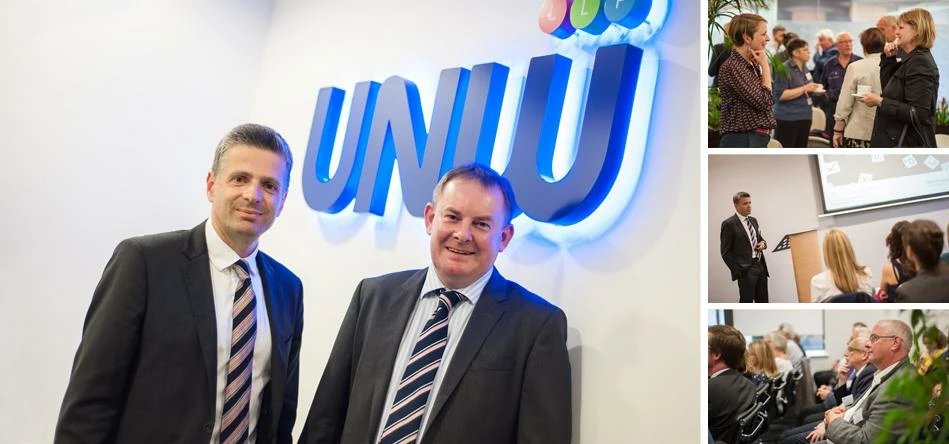
Partner Article
UNW Events Programme 2016: Brexit, what does it mean for the charity sector?
When the United Kingdom voted to leave the European Union on the 23rd of June 2016, one main issue became increasingly apparent; nobody really knew what was going to happen. Ironically, many politicians who had campaigned for a leave vote seemed very keen to leave their positions in the days that followed, David Cameron tendered his resignation as Prime Minister, and the value of the pound plummeted. It was all a bit of a mess.
It would have taken a gargantuan effort to avoid the topic of Brexit, with the mass media coverage predicting impending doom if the vote to remain did not materialise. Now, almost three months later, what can we predict about the impact of Brexit on the charity sector?
Over 40 representatives from charities and not for profit organisations attended UNW’s recent charity briefing – where James Garbutt, Investment Director at Rathbones, was joined by UNW’s VAT Partner Mark Hetherington in delivering an expert guide into what could happen when the government finally triggers Article 50, and what this may mean for charities here in the North East.
Charity representatives from across the region listened attentively as Mark and James outlined the consequences of the Brexit vote, and shared their expertise on what action to take from a non-profit perspective. It was evident from those in attendance that clarification regarding funds already resting in accounts was of paramount importance; discipline and realism seemed to be two key words to take from the briefing.
EU Funding
In 2014, 250 UK charities received approximately £220 million in funding from the EU. Despite still officially being a member, it is entirely plausible that this funding will soon disappear. The main focus James highlighted was, however, that it is simply uncertain rather than set in stone. Focussing on one example of a charity within the education sector, James pointed out that they have had to delay plans, due to uncertainty surrounding their EU funding. The EU makes up a relatively small (0.5%) proportion of the charity sector’s overall funding, but other organisations providing grants to charity organisations are also likely to be affected by Brexit in some form; regular communication with the appropriate bodies is vital until there is some real clarity on the situation.
Interest Rates
The recession of 2009 saw the Bank of England cut interest rates to 0.5%, and the Brexit vote has led to that being halved again last month. Rates are unlikely to rise in the near future, meaning returns on cash will remain at rock bottom. Companies will therefore have to apply real risk in the hunt for yield, but this is not a realistic proposition for those in the charity sector. James advised audience members not to make any rash decisions with funds.
VAT
With around £115 billion provided to the government through VAT each year, there is no chance they will abolish the revenue anytime in the foreseeable future. In the wake of Brexit, without hands tied due to EU law, tinkering with the VAT system is a possibility. Changes would most likely be minor, however, but there may be better prospect of charities being able to lobby for additional zero-related VAT reliefs.
Citing Longridge on the Thames as an example, Mark warned the audience about setting the bar higher when approaching councils for grant funding. Longridge on the Thames was a case that raised fears that VAT exemptions for charities could be lost. Negotiating for the potential VAT charge to be supplied in addition to the requested grant would be most advisable.
When an audience member asked about the possibility of VAT charges being introduced on charitable donations, Mark reiterated his belief that it would never become a realistic prospect in the UK.
For more information on this topic or for details about UNW’s events programme please contact 0191 243 6000 or email events@unw.co.uk
This was posted in Bdaily's Members' News section by Richard Turnbull .
Enjoy the read? Get Bdaily delivered.
Sign up to receive our daily bulletin, sent to your inbox, for free.








 £100,000 milestone drives forward STEM work
£100,000 milestone drives forward STEM work
 Restoring confidence for the economic road ahead
Restoring confidence for the economic road ahead
 Ready to scale? Buy-and-build offers opportunity
Ready to scale? Buy-and-build offers opportunity
 When will our regional economy grow?
When will our regional economy grow?
 Creating a thriving North East construction sector
Creating a thriving North East construction sector
 Why investors are still backing the North East
Why investors are still backing the North East
 Time to stop risking Britain’s family businesses
Time to stop risking Britain’s family businesses
 A year of growth, collaboration and impact
A year of growth, collaboration and impact
 2000 reasons for North East business positivity
2000 reasons for North East business positivity
 How to make your growth strategy deliver in 2026
How to make your growth strategy deliver in 2026
 Powering a new wave of regional screen indies
Powering a new wave of regional screen indies
 A new year and a new outlook for property scene
A new year and a new outlook for property scene